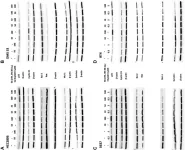(Press-News.org) PORTLAND, Ore. – Researchers who work with tiny drug carriers known as lipid nanoparticles have developed a new type of material capable of reaching the lungs and the eyes, an important step toward genetic therapy for hereditary conditions like cystic fibrosis and inherited vision loss.
Findings of the study led by Gaurav Sahay and Yulia Eygeris of the Oregon State University College of Pharmacy and Renee Ryals of Oregon Health & Science University were published today in the Proceedings of the National Academy of Sciences.
Unlike other types of lipid nanoparticles that tend to accumulate in the liver, the ones in this study, based on the compound thiophene, are able to navigate their way to the tissues of the lungs and retina, where they deliver their therapeutic payload. The researchers refer to these new lipids as Thio-lipids.
The collaboration demonstrated, by using animal models, the possibility of using Thio-lipids in lipid nanoparticles to deliver messenger RNA, the technology underpinning COVID-19 vaccines, to combat genetic blindness and pulmonary disease.
“These nanoparticles filled with fatty lipids can encapsulate genetic medicines like mRNA and CRISPR-Cas9 gene editors, which can be used to treat and even cure rare genetic diseases,” said Eygeris, a senior research associate at OSU. “Chemical structures of the lipids determine how potent are the lipid nanoparticles and which organ they can reach from the bloodstream.”
Lipids are organic compounds containing fatty tails and are found in many natural oils and waxes, and nanoparticles are tiny pieces of material ranging in size from one- to 100-billionths of a meter. Messenger RNA delivers instructions to cells for making a particular protein.
With the coronavirus vaccines, the mRNA carried by the lipid nanoparticles instructs cells to make a harmless piece of the virus’ spike protein, which triggers an immune response from the body.
As a therapy for vision impairment resulting from inherited retinal degeneration, the mRNA would instruct cells in the retina – which don’t work right because of a genetic mutation – to manufacture the proteins needed for sight. Inherited retinal degeneration, commonly abbreviated to IRD, encompasses a group of disorders of varying severity and prevalence that affect one out of every few thousand people worldwide.
An example of a genetic pulmonary condition is cystic fibrosis, a progressive disorder that results in persistent lung infection and affects 30,000 people in the U.S., with about 1,000 new cases identified every year.
One faulty gene – the cystic fibrosis transmembrane conductance regulator, or CFTR – causes the disease, which is characterized by lung dehydration and mucus buildup that blocks the airway.
The thiophene-based lipid nanoparticle study, which involved mice and non-human primates, stems from a $3.2 million grant to Sahay and Ryals from the National Eye Institute. The grant’s purpose is addressing limitations associated with the current primary means of delivery for gene editing: a type of virus known as adeno-associated virus, or AAV.
“AAV has limited packaging capacity compared to lipid nanoparticles and it can prompt an immune system response,” said Sahay, a professor of pharmaceutical sciences. “It also doesn’t do fantastically well in continuing to express the enzymes the editing tool uses as molecular scissors to make cuts in the DNA to be edited.”
Sahay calls the Thio-lipid findings “highly encouraging” but says more studies are needed, including research on the lipids’ long-term impact on retinal health.
“But we think our results serve as a proof of concept and we will continue to explore Thio-lipids in potential treatments of pulmonary and retinal genetic diseases,” he said.
Other OSU College of Pharmacy researchers contributing to the study were Mohit Gupta, Jeonghwan Kim, Antony Jozic, Milan Gautam, Jonas Renner, Dylan Nelson and Elissa Bloom.
In addition to the National Eye Institute, funding and research support were provided by the Oregon National Primate Research Center and the Casey Eye Institute.
END
Researchers closing in on genetic treatments for hereditary lung disease, vision loss
2024-03-04
ELSE PRESS RELEASES FROM THIS DATE:
COVID-19 associated with increased risk for autoimmune inflammatory rheumatic diseases up to a year after infection
2024-03-04
Below please find summaries of new articles that will be published in the next issue of Annals of Internal Medicine. The summaries are not intended to substitute for the full articles as a source of information. This information is under strict embargo and by taking it into possession, media representatives are committing to the terms of the embargo not only on their own behalf, but also on behalf of the organization they represent.
----------------------------
1. COVID-19 associated with increased risk for autoimmune inflammatory rheumatic diseases up to a year after infection
Vaccination showed some protection against AIRDs, depending on severity ...
UC Irvine receives $15 million NSF grant for integrative movement research
2024-03-04
Irvine, Calif. March 4, 2024 — The National Science Foundation has granted $15 million to the Integrative Movement Sciences Institute at the University of California, Irvine. This six-year funding, part of the NSF’s Biology Integration Institutes program, will support groundbreaking research led by Monica Daley, professor of ecology & evolutionary biology at the UCI School of Biological Sciences.
The research funded by this grant aims to understand the intricate mechanics of muscle control during rapid, unsteady movements in complex environments. Muscle ...
University of Houston engineer Metin Akay featured in study highlighting 50 scientists' contributions to biomedical engineering advancements
2024-03-04
Metin Akay, founding chair of the Biomedical Engineering Department at the University of Houston and John S. Dunn Professor, is one of 50 top scientists from 34 elite universities to publish a roadmap for groundbreaking research to transform the landscape of medicine in the coming decade.
Published on behalf of the Institute of Electrical and Electronics Engineers (IEEE), the world’s largest technical professional organization dedicated to advancing technology for humanity and the IEEE Engineering in Medicine and Biology Society (IEEE EMBS), the paper focus ...
JWST captures the end of planet formation
2024-03-04
March 4, 2024, Mountain View, CA – The James Webb Space Telescope (JWST) is helping scientists uncover how planets form by advancing understanding of their birthplaces and the circumstellar disks surrounding young stars, in a paper published in the Astronomical Journal, a team of scientists led by Naman Bajaj of the University of Arizona and including Dr. Uma Gorti at the SETI Institute, image for the first time, winds from an old planet-forming disk (still very young relative to the Sun) which is actively dispersing its gas ...
Good news—MS drugs taken while breastfeeding may not affect child development
2024-03-04
EMBARGOED FOR RELEASE UNTIL 4 P.M. ET, MONDAY, MARCH 4, 2024
MINNEAPOLIS – Certain medications for multiple sclerosis (MS) called monoclonal antibodies, taken while breastfeeding, may not affect the development of a child during the first three years of life, according to a preliminary study released today, March 4, 2024. The study will be presented at the American Academy of Neurology’s 76th Annual Meeting taking place April 13–18, 2024, in person in Denver and online. The study examined four monoclonal antibodies for MS: natalizumab, ocrelizumab, rituximab and ofatumumab.
MS is a disease in which the body’s immune system attacks ...
Programs intended to reduce health insurance premiums may make coverage less affordable for the middle class
2024-03-04
PITTSBURGH, March 4, 2024 — Reinsurance programs, which were created to help lower premiums and increase enrollment in the Affordable Care Act’s health insurance marketplaces, may have had the opposite effects for many potential marketplace enrollees, according to a study by health policy researchers at the University of Pittsburgh School of Public Health, Duke University and University of Minnesota.
The study, published today in Health Affairs, is the first to examine the effects of a post-American Rescue Plan Act ...
PrEP discontinuation in a US national cohort of sexual and gender minority populations, 2017–22
2024-03-04
In the U.S., sexual and gender minority populations are disproportionately affected by HIV. Pre-exposure prophylaxis (PrEP) is a key prevention method, but its effectiveness relies on consistent usage. While a significant body of research has addressed PreP initiation and adherence, far less attention has been paid to the reasons for and consequences of PrEP discontinuation.
A team of investigators conducted a four-year U.S. national cohort study exploring PrEP discontinuation among sexual and gender minority people who initiated PrEP. “Our cohort was entirely comprised of individuals ...
USC Study: Medicare Part D plans increased restrictions on drug coverage
2024-03-04
Medicare Part D plans significantly increased restrictions on prescription drugs, excluding more compounds from coverage or subjecting more of them to review before patients could access the treatments, according to a new study from USC researchers.
Among drugs not in Medicare “protected classes,” the share of drug compounds restricted or excluded by Part D plans surged from an average of 31.9% in 2011 to 44.4% in 2020, according to the study published in the March 2024 issue of Health Affairs. Brand-name-only compounds (those without a generic alternative) were especially limited, with more ...
Sacituzumab govitecan plus platinum-based chemotherapy in breast, bladder, and lung carcinomas
2024-03-04
“[...] these results support the rationale and potential for favorable clinical outcomes of combining SG therapy with platinum-based chemotherapeutics in solid tumors.”
BUFFALO, NY- March 4, 2024 – A new research paper was published in Oncotarget's Volume 15 on February 22, 2024, entitled, “Sacituzumab govitecan plus platinum-based chemotherapy mediates significant antitumor effects in triple-negative breast, urinary bladder, and small-cell lung carcinomas.”
Sacituzumab govitecan (SG) is an antibody-drug conjugate composed of an anti-Trop-2-directed antibody ...
Global study unveils "problematic" use of porn
2024-03-04
A major international study led by a Canadian psychologist sheds light on a hidden phenomenon: how problematic use of pornography is affecting people in different parts of the world, across various genders and sexual orientations.
Published in the journal Addiction, the research stands out because, among the 82,000 people in 42 countries studied, it looks at groups that were often overlooked in the past, including women and individuals who don't fit traditional gender categories.
In their findings, largely based on ...





